I have just had the privilege of spending nearly a week in the wonderful naval town of Karlskrona in Sweden.

In 1679 King Karl XI of Sweden declared that Karlskrona should become the home for the Swedish Fleet. Its first location, in Stockholm, was proving a disadvantage in their war against Denmark. The Danish Fleet, based in Copenhagen, unfroze before they did and the Swedish ships were unable to defend themselves whilst the Danish took a pop at western Sweden.
I was in a week long maritime-focused meeting based in the Naval Museum.

What a wonderful venue for a heap of nautically passionate people!
At lunchtimes/coffee breaks, if we had time, we were able to explore.
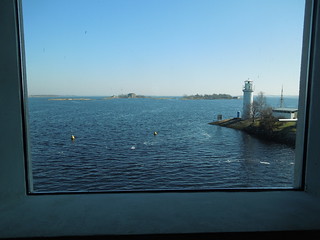

An old mine hunter.

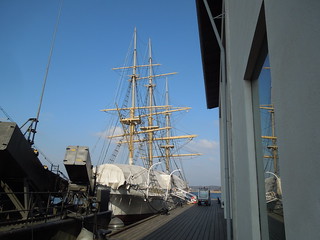
Karlskrona is on one of many islands and the views were wonderful. Especially as we had sun for most of our trip.

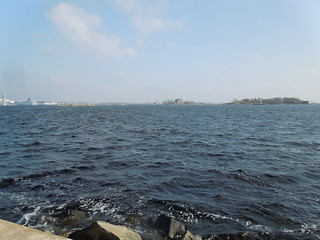
I found a couple of lighthouses.

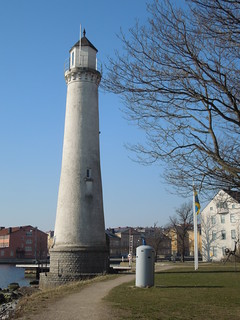
And even a messpunkt! (or rather a Mat Punkt - the Swedish equivalent).

I didn’t have much time to mooch around the museum so knew exactly which exhibit to focus on.
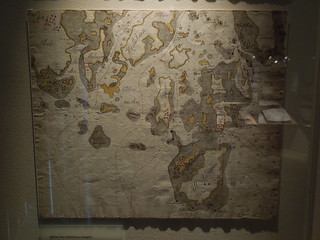
I made a bee-line for the navigation area.
Lots of lovely sextants, old charts and compasses.
 .
.
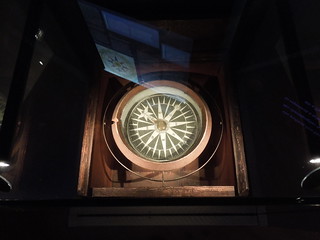
We enjoyed using the astrolabe to measure our latitude.
I was hopelessly in error (the computer retorted “your crew want to know what you are up to…”).

A naval officer then had a go – to show me how to do it properly – and he was equally off the mark.

I suspect that when I dropped the astrolabe first off I put it back together incorrectly. Doh.
Near the naval museum is a small workshop for boat making apprentices. We were welcomed in and indulged our senses - both visual and aromatic – gazing at these beautiful boats and breathing in lungful’s of oak scent.

Ooh, a chart.

This guy was pretty devoted to his craft. He estimated that with working 4 days a week on this boat he’d finish it around the summer of 2017. Now that’s dedication.
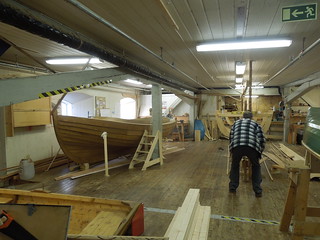
One evening we visited the Officer’s Club. It has an amazing library with oodles of historical documents.
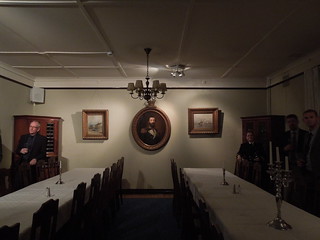

It was all somewhat casually handled: I know in our archive we touch these precious documents gloved. In this library we were allowed pick up what we fancied. Although most of us, recognising the precious nature of these items, didn’t.

We also managed to fit in a visit to the submarine museum there.
This was the first submarine the Swedish Navy had which came into service in 1904. It could only dive for a few hours and there was no messing nor sleeping arrangements onboard. Cooking was done on the top deck whilst surfaced (obviously) and sailors slept where they could in the cold, single hulled vessel.
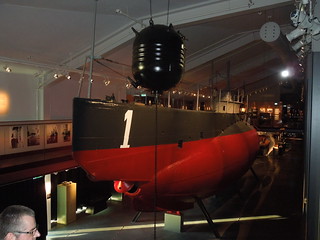
This submarine., HMS Neptun, was retired around a decade ago so a lot more modern.

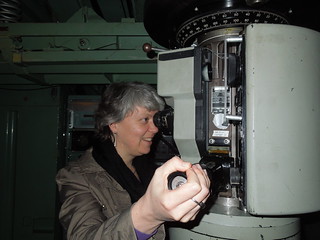
A tincy tiny chart table.

On our last day it clouded over. No great shakes except it happened to be the day of the partial solar eclipse.
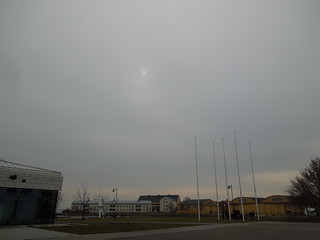
I put my shades on but I hardly needed to.


In 1679 King Karl XI of Sweden declared that Karlskrona should become the home for the Swedish Fleet. Its first location, in Stockholm, was proving a disadvantage in their war against Denmark. The Danish Fleet, based in Copenhagen, unfroze before they did and the Swedish ships were unable to defend themselves whilst the Danish took a pop at western Sweden.
I was in a week long maritime-focused meeting based in the Naval Museum.

What a wonderful venue for a heap of nautically passionate people!
At lunchtimes/coffee breaks, if we had time, we were able to explore.


An old mine hunter.


Karlskrona is on one of many islands and the views were wonderful. Especially as we had sun for most of our trip.


I found a couple of lighthouses.


And even a messpunkt! (or rather a Mat Punkt - the Swedish equivalent).

I didn’t have much time to mooch around the museum so knew exactly which exhibit to focus on.

I made a bee-line for the navigation area.
Lots of lovely sextants, old charts and compasses.
 .
.
We enjoyed using the astrolabe to measure our latitude.
I was hopelessly in error (the computer retorted “your crew want to know what you are up to…”).

A naval officer then had a go – to show me how to do it properly – and he was equally off the mark.

I suspect that when I dropped the astrolabe first off I put it back together incorrectly. Doh.
Near the naval museum is a small workshop for boat making apprentices. We were welcomed in and indulged our senses - both visual and aromatic – gazing at these beautiful boats and breathing in lungful’s of oak scent.

Ooh, a chart.

This guy was pretty devoted to his craft. He estimated that with working 4 days a week on this boat he’d finish it around the summer of 2017. Now that’s dedication.

One evening we visited the Officer’s Club. It has an amazing library with oodles of historical documents.


It was all somewhat casually handled: I know in our archive we touch these precious documents gloved. In this library we were allowed pick up what we fancied. Although most of us, recognising the precious nature of these items, didn’t.

We also managed to fit in a visit to the submarine museum there.
This was the first submarine the Swedish Navy had which came into service in 1904. It could only dive for a few hours and there was no messing nor sleeping arrangements onboard. Cooking was done on the top deck whilst surfaced (obviously) and sailors slept where they could in the cold, single hulled vessel.

This submarine., HMS Neptun, was retired around a decade ago so a lot more modern.


A tincy tiny chart table.

On our last day it clouded over. No great shakes except it happened to be the day of the partial solar eclipse.

I put my shades on but I hardly needed to.

No comments:
Post a Comment